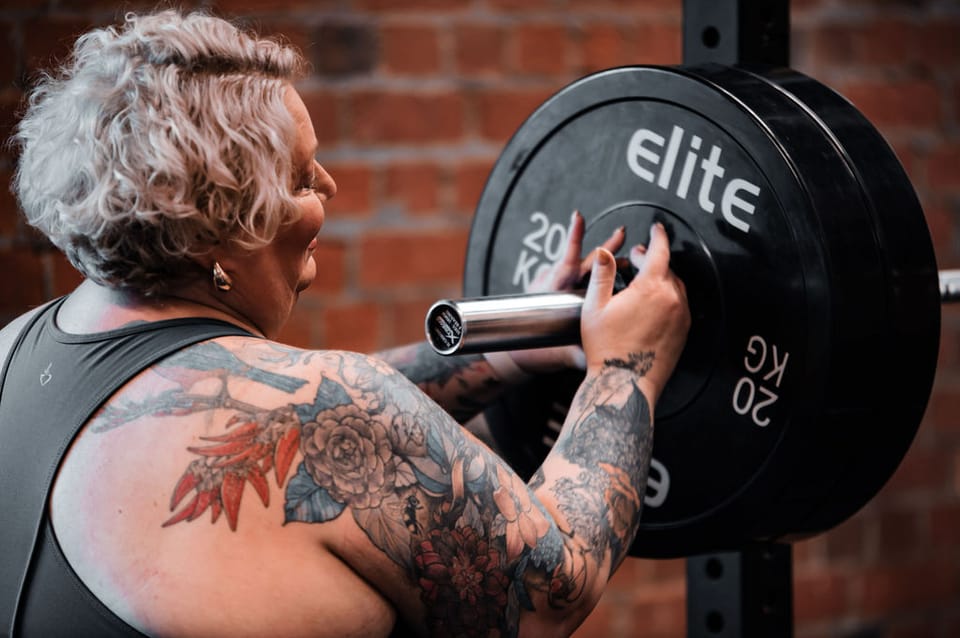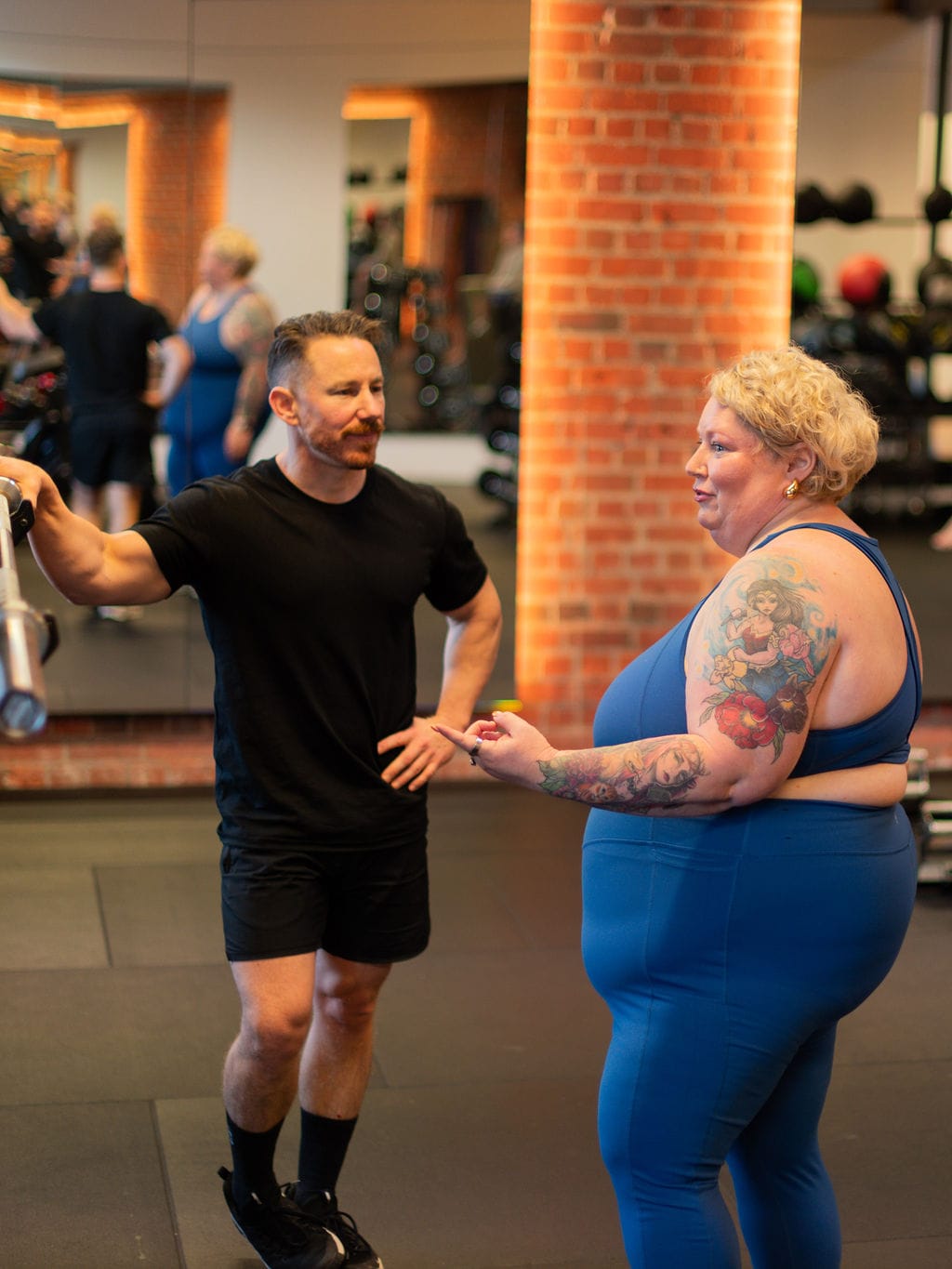On Competing

This week: Megan and Carl are both preparing for their first powerlifting competition. Below, Megan shares her thoughts. Carl responds with the plan.
“Would you describe me as competitive?” I recently asked my best friend — the person who knows me better than anyone in the world.
“Did someone say you’re not? Have they met you?” she replied. Ow.
Over the past few years, since I started lifting in earnest, people have asked if I compete — or if I’m going to. Until very recently, the answer was always no.
I told people it was because I love lifting for its own sake. That I like competing with myself — or at least with my past self — and I don’t need to validate that against anyone else. I genuinely enjoy the slow, steady process of getting a little stronger each week.
And that’s true. I do love that. My goal has always been to improve my form, increase my mobility, and keep showing up.
But.
I also like making myself do scary things. And Carl is excellent at goading me into doing shit that makes me uncomfortable. (See last week’s mention of incorporating plyometrics.) So in a few weeks, we’re doing a novice powerlifting competition. And two things are scaring me.
One’s big. It’s not just that I’m competitive — it’s that I’m bad at being bad at things. And I’m a bad loser. (I’m very fun to be around.)
I’ve spent most of my life avoiding things I didn’t think I’d be good at right away. My whole extended family loves golf, and I’ve never played in a family tournament. Not because I don’t want to — but because I know I’d be terrible at it. I hate scrabble because I am good at words and I don’t understand why I suck at scrabble. (I am especially fun to be around with board games.)
Lifting is one of the first things I was objectively bad at — and stuck with. It’s taught me that to get better, you have to be willing to be bad. You have to push to failure, improve incrementally, and be OK with not knowing if you can pull something off.
There are things I trust now that I didn’t trust four years ago:
Progressive overload.
Rest days.
Consistency.
Carbohydrates.
And against all odds, my knees.
The second fear is smaller, but sharper: the public weigh-in. As a woman who has spent her life being fat in public, the idea of my weight being displayed anywhere is terrifying.
But even that pales compared to the fear that I’ll walk into that room in Feilding, a few weeks from now, and fall out of love with lifting — just because I’m not the best in the room.
It’s not that I think I should be the best. It’s certainly not that I will be. I’ve seen what women my age and size can lift, and I’m gobsmacked.
I’m scared of that little voice in my head that whispers, “Well, if you’re not the best, what value do you have?”
So: I’ve decided to lean into that fear.
Carl’s programmed us for the next several weeks, building toward maxing our lifts on comp day.
And as I do the big lifts, I am trying to remember — the point isn’t to beat the person on the other side of the room. It’s to be better than the Megan who showed up yesterday.
As usual, I bring the feelings. Carl’s bringing the science.
CARL: THE PLAN
Before I get to the programming, I have to say — I really relate to Megan’s relationship with competition.
It might sound strange, considering I’ve competed in various sports throughout my life. But the truth is, I’ve been a terrible loser — and probably an even worse winner. If I knew I’d done well, or even won an event, I’d do the classic Kiwi thing: dismiss any praise, move on, and set myself another probably unrealistic goal.
That mindset definitely helped me achieve things — I have multiple national titles in competitive sport — but I didn’t allow myself to enjoy the process or the outcome. So what was the point?

In recent years, I’ve challenged that. I’ve found real joy in entering things with no expectation of winning — just the goal of getting better. Usually through suffering and pushing past the moments when that sneaky voice creeps in. The one that whispers: “Now would be a good time to give up. You’ve done well enough.”
Challenging that voice, and shifting my mindset, has helped me build some real mental grit — something that’s carried over into all sorts of areas of life. That, along with falling in love with the process itself — the challenge and the outcome — has made life a whole lot more fun.
Looking back, I do regret not trying more things outside my natural ability. But I’m grateful for the growth that’s come from changing my relationship with competition. These days, failure in the physical arena (and elsewhere) actually excites me.
So, here we are — both signed up and committed to a powerlifting competition. We’re pretty green going into this. I have knowledge of scientific programming, but no experience competing in this specific arena.
For those who don’t know: in powerlifting, you compete against others (grouped by weight and age) across three lifts:
- Squat
- Deadlift
- Bench press
The person with the highest total in their class wins. But for us, this is about personal challenge. We’ve set our own targets and are doing our best to ignore what anyone else is lifting.
Megan’s Programming Plan
When prescribing a programme, I always consider personal factors like these:
- Primary goal: 350kg total across all three lifts (M: this is a stretch goal!)
- Current position: ~330kg total
- Weaknesses: Bench press consistency, squat depth
- Barriers: Time/work travel schedule, minor shoulder and golfer’s elbow niggles
- Time & tools available: 3–4 sessions per week, mostly at Healthfit Wellington with full gym access
- Enjoys/Dislikes/Preferences: Megan enjoys almost anything involving lifting heavy things (yes, even Bulgarian split squats — apparently). (M: I know. I am a freak.)
Life (the usual real-world stuff): The first two weeks involve travel for work, so resources and consistency will be limited.
6-Week Outline (including taper):
Week 1 — Busy with work/travel6 reps, 4 sets on big lifts, tempo 1.1.1, 1RIR (Reps in Reserve)
Week 2 — Still travel-affected3–5 reps, 5 working sets on big lifts. Start pushing weight and testing boundaries.Introduce plyometric and power training to boost recruitment and RFD (rate of force development).
Week 3 — Normal weekDescending sets: 8, 6, 4, 2, 1RM. Long rest intervals (2 mins between sets).
Week 4 — High load week6, 4, 2, 1, APB (Attempted Personal Best).Overload training: complex training — heavy lifts superset with explosive work.
Week 5 — High load week6, 4, 2, 1, APB.Overload training: eccentric or partial lifts.
Week 6 — Taper weekTwo sessions only.3 sets, well below threshold, slow tempo, full range of motion — focus on technique.Mobility, foam rolling, active recovery.
Currently, I’ve broken the programming into three main 45–60 minute sessions per week, with one additional session focused on a priority lift during our PT session:
- Squat + accessory & supplementary exercises
- Bench press + accessory & supplementary exercises
- Deadlift + accessory & supplementary exercises
This is a flexible, adaptable plan — because life happens, niggles pop up (more on that in another post!), and we might need to tweak things as we go. I’ve also got a few technical ideas I’d like to trial, and we need to research the comp day itself.
Here’s to discomfort, failures, laughs, achievements — and, mostly, growth.
Cool things we’ve seen this week:
(Carl) Ed Coan’s (Powerlifting world champion known as the greatest of all time) 10 week deadlift routine - Not recommended for beginners! It was just interesting and the volume is insane!
(Carl) A recent interview with my favourite anthropologist professor Pontzer on being human and having individual physiology - RNZ interview and my old podcast interview with him here around bridging the gap between our ancestors and humans today. He has studied in depth many modern hunter gatherer tribes to try and delineate the key factors in wellbeing.
(Megan) "Nevertheless, strength training has begun to trend up among women. Recent high-profile research found that lifting weights significantly increases both lifespan and healthspan for women. In turn, wellness-focused women’s media — which is to say most women’s media — began publishing trend pieces admonishing women to step up their muscle game. One study from this February found that women’s participation rates in strength training are higher than ever before.) (Vox)
(Megan) According to my friends "furious and jacked" will be the title of my autobiography.
(Megan) I was all set to roll my eyes at this article, and then I read the words "Dr James Morehan, performance nutritionist for England Rugby, and Aimee Ellen O’Keeffe, sports nutritionist for the England Roses." Do I want to eat the same snacks as the Roses? Yes, yes I do. (BBC)
(Megan) "Should you do cardio before or after lifting weights?" is the headline. I don't understand the question. (The Conversation)
(Megan) Frankly, I am appalled. (WaPo gift link)
